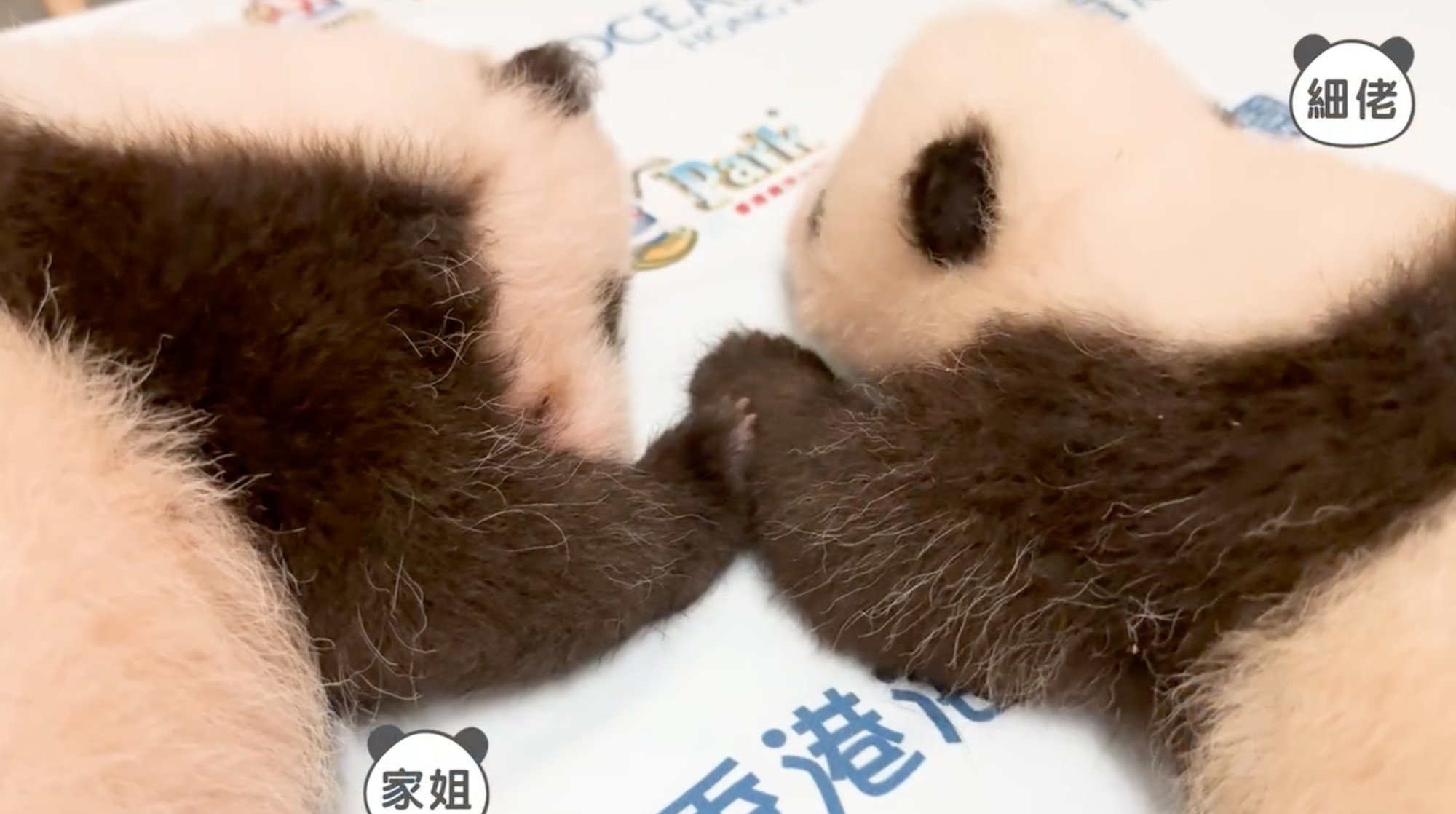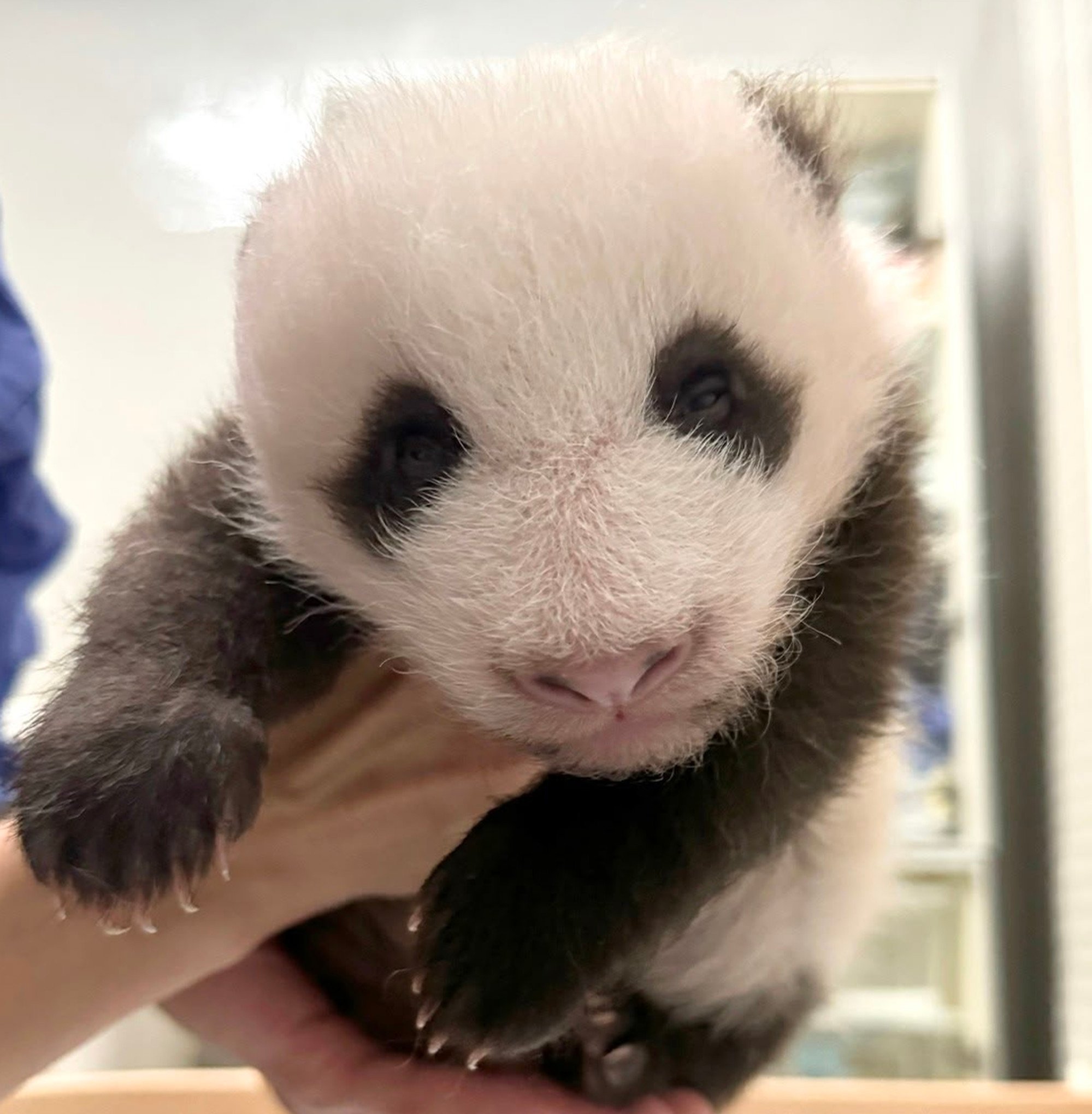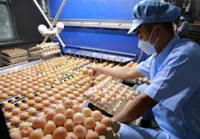
Hong Kong’s panda cubs have started to take a peek at the world around them, while the pair have also graduated from their incubators and are developing ever-thicker coats as they reach seven weeks of age.
“In the past few days, the panda caretaker team at the park has noticed that when the panda twin cubs wake up, their eyes are slightly open!” Ocean Park said in an Instagram post.
Do you have questions about the biggest topics and trends from around the world? Get the answers with SCMP Knowledge, our new platform of curated content with explainers, FAQs, analyses and infographics brought to you by our award-winning team.
“Our cuties are starting to see the world.”
The park said earlier this week that the elder cub weighed more than 1.6kg (3.5lbs), while the younger one was lighter at around 1.4kg.
It added that the bears were transferred from their incubators into cots as they had got better at regulating their body temperatures and their fur had thickened.
The two cubs were also captured in a rare moment together, with the “Elder Sister” placing her paw on her brother’s arm.
Normally, one cub spends time with a caretaker as the other is nursed by Ying Ying, who is learning the ropes of motherhood.
“These precious moments were captured while Ying Ying was having her ‘me time’ to enjoy food and ‘Little Brother’ came back to weigh in,” the park said.
Like humans, pandas also receive health check-ups.

According to the Chengdu Research Base of Giant Panda Breeding, diseases pose the greatest threat to the survival of pandas.
“Diseases affecting the digestive, respiratory, nervous and hematopoietic systems are often fatal,” it said.
“Additionally, various tumours, internal and external parasitic infections, skin diseases and injuries can all impact the health and lifespan of giant pandas.”
Matt Leung, a caretaker at Ocean Park, said staff measured the pandas’ blood pressure by placing the bears’ forearms through a metal frame where they could attach a medical device.
“Just like humans, high blood pressure is often associated with old age for pandas,” he said.
Caretakers also have to trim the claws regularly to prevent them from becoming ingrown, especially for older pandas, which are less active.
“For Ying Ying and Le Le who are still physically fit for their age, doing exercise helps wear down their claws,” he said.
Leung said dental check-ups were also part of the healthcare routine, as the pandas’ teeth might wear down given that they chewed huge amounts of bamboo stems and leaves daily.
“Bits and pieces from bamboo leaves and stems may get stuck between teeth and cause infection, so we need to ask our pandas to open their mouths so we can have a better look,” he said.
According to the team at the Smithsonian’s National Zoo and Conservation Biology Institute in Washington, caretakers train the bears with positive reinforcement in which good behaviour is recognised with rewards.
This includes training them to move around their habitat, stand still on a scale and present parts of their bodies for evaluation upon cue.
As a reward, they are given attention and snacks such as bamboo, apples, pears, sweet potatoes and high-fibre biscuits.
“When we ask the pandas to do something, they can choose to voluntarily participate, knowing they will be rewarded. If they don’t want to participate, they don’t have to,” the zoo said.

It noted that each panda had a unique personality and learned differently, and such interactions helped establish and maintain the bond between animal and keeper.
Back in 2017, the team at the zoo performed a routine check for panda Tian Tian under anaesthesia in which staff took blood and urine samples, conducted an X-ray and performed an ultrasound to look at his organs.
They also performed acupuncture and laser treatment on the bear.
“The acupuncture may help improve some of Tian Tian’s overall muscle tone, and the laser treatment may help suspected arthritis in his left shoulder,” the zoo said.
Elder Sister’s weight: Over 1.6kg
Little Brother’s weight: Over 1.4kg
Development: Eyes opening slightly, leaving the incubator and sleeping in cots
More from South China Morning Post:
- Panda personalities: adventurous An An, cautious Ke Ke adjust to Hong Kong at own pace
- Naming contest for giant pandas gifted to Hong Kong by Beijing open to public
- Hong Kong’s Cathay sent ‘top guns’ to transport giant pandas from Chengdu, aided by team of 90
For the latest news from the South China Morning Post download our mobile app. Copyright 2024.









































